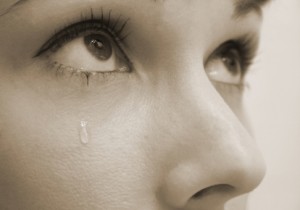Leah’s eyes, the Bible tells us, are delicate from so many tears. Tears shed, tradition teaches, for good reason. First, the town gossips in Padan-Aram wagged like caricatures (and not off-base ones, even if too unkind) of the matchmaker in Anatevka: Laban’s two daughters would be matched to Isaac’s two boys. Esau and Leah. Jacob and Rachel.

Still, Jacob never favors Leah. At the final confrontation between Esau, his 400 men and Jacob’s family, numbering less than two dozen, including children and an old nurse, Rachel, as Jacob’s most precious, is symbolically (it probably wouldn’t have mattered much had it come to blows) placed at the rear.
Leah, more than any of the matriarchs (perhaps more than anyone in the Bible until Hannah) is most aware of the good in her life. She is, after all not married to Esau. Each time she names a child, it acknowledges the good G-d did.
Moreover, tradition teaches that at the same time Leah carried Benjamin, Rachel carried Dina. Knowing Rachel wouldn’t even bear Jacob as many sons as the maids, Leah prayed again. And tradition teaches an angel switched the children in utero.
There are two political lessons here. One, as Leah teaches us is that even when things aren’t perfect, there is much good. There is much to be thankful for and much help, friendship, assistance and aid to acknowledge. Leah does not rail at G-d or Jacob that her dreams remain unfulfilled. She thanks G-d for the good.
And she pulls back from a seventh son. Whatever the pain she feels or hurt she endures, she will not allow herself to cause eternal pain to her sister. Better Jacob to love her less but Rachel shan’t be lessened on her account. (In this sense, Leah foreshadows Alistair Cooke’s observation that “a professional is someone who can do his best work when he doesn’t feel like it.”)
All too often we look at what’s broke in the political system. Taxes too high (some say too low). Our civil liberties are threatened or our security apparatus is too lax. This is especially so when we look at our political opponents, as individuals or as parties and movements. We see the negative, the bombast, the fringe and the silly. We fail to acknowledge the positive, laud the service and excuse the freaks. In legislative and electoral battle, we go for the killing blow, unwilling to save our opponents any dignity.
But Leah teaches that we ought to focus on the good, even as we try to make better what is wrong. Our hurt and anger don’t excuse or allow us to destroy another’s future.
Political lessons, but equally applicable in our daily lives.
Words to consider, ideas to ponder – politics and the parsha.
The words of this author reflect his/her own opinions and do not necessarily represent the official position of the Orthodox Union.
